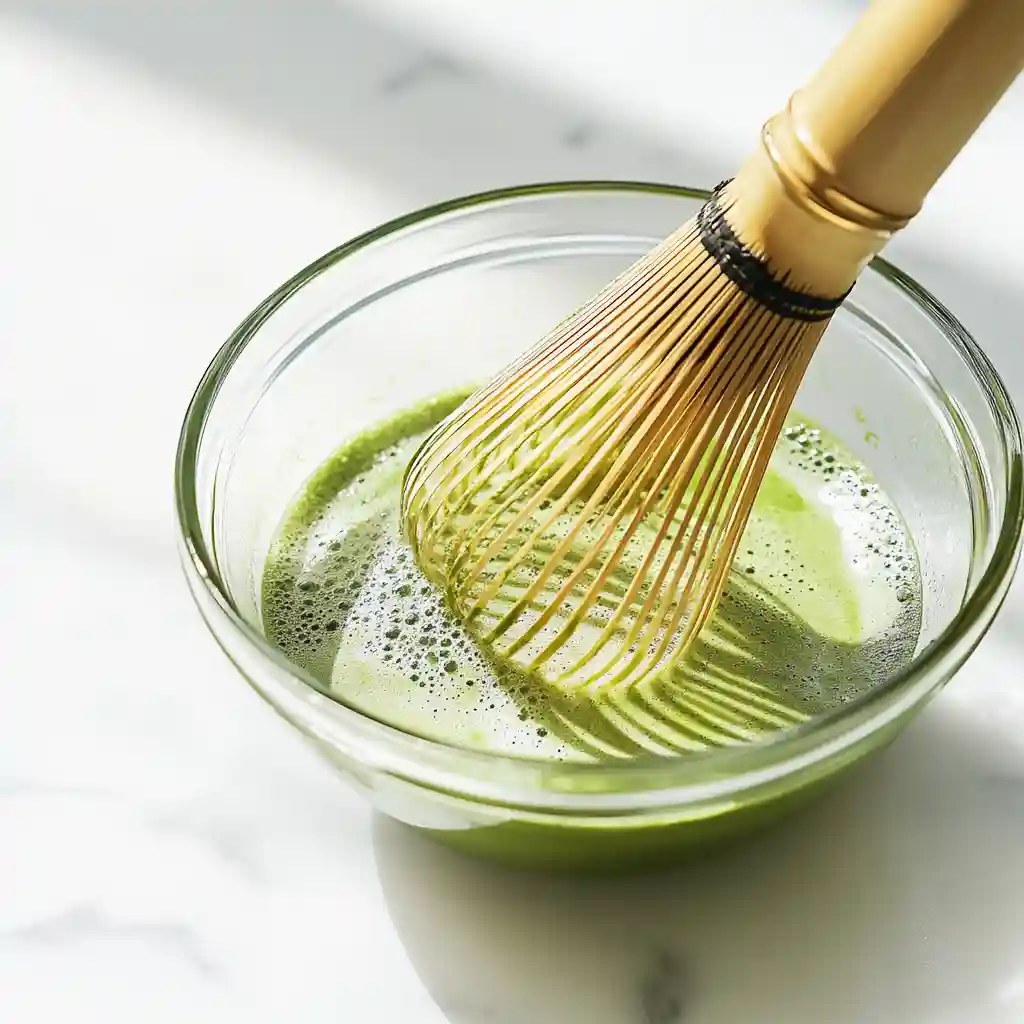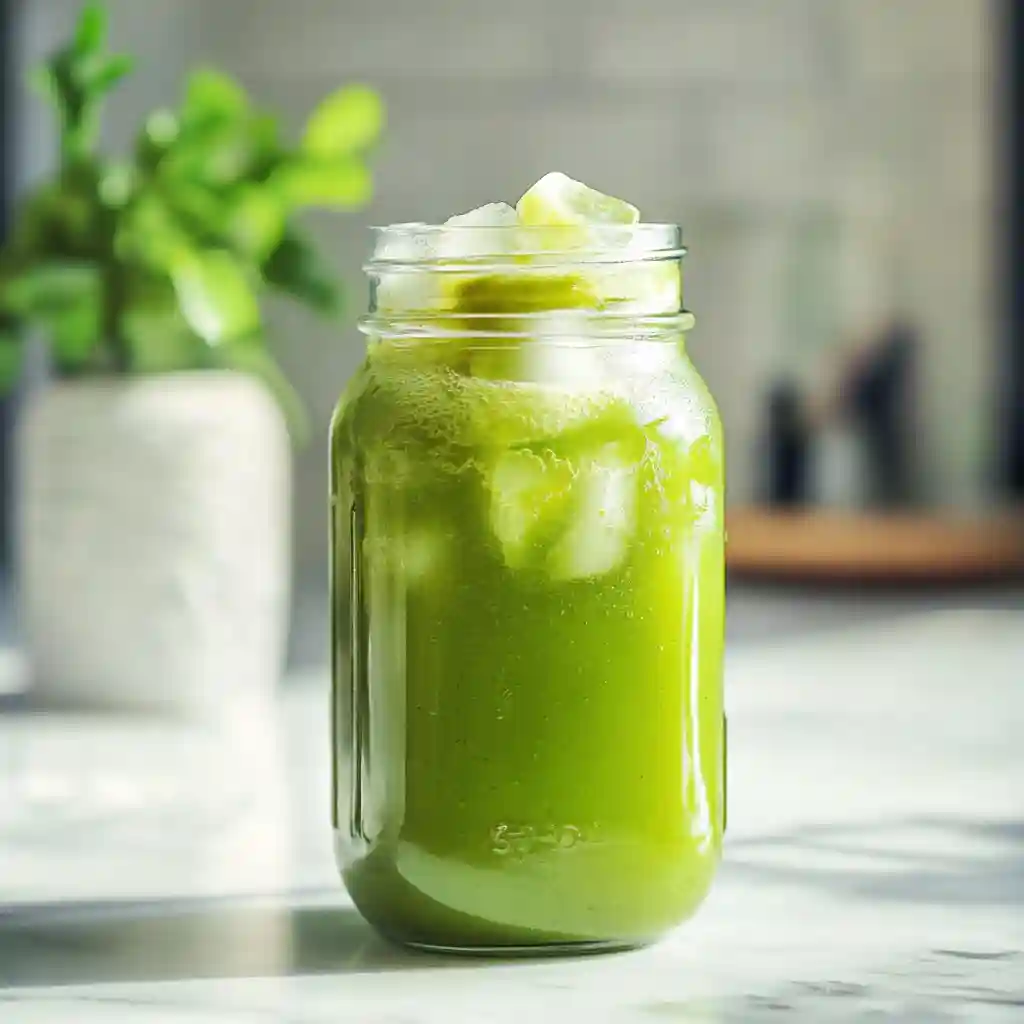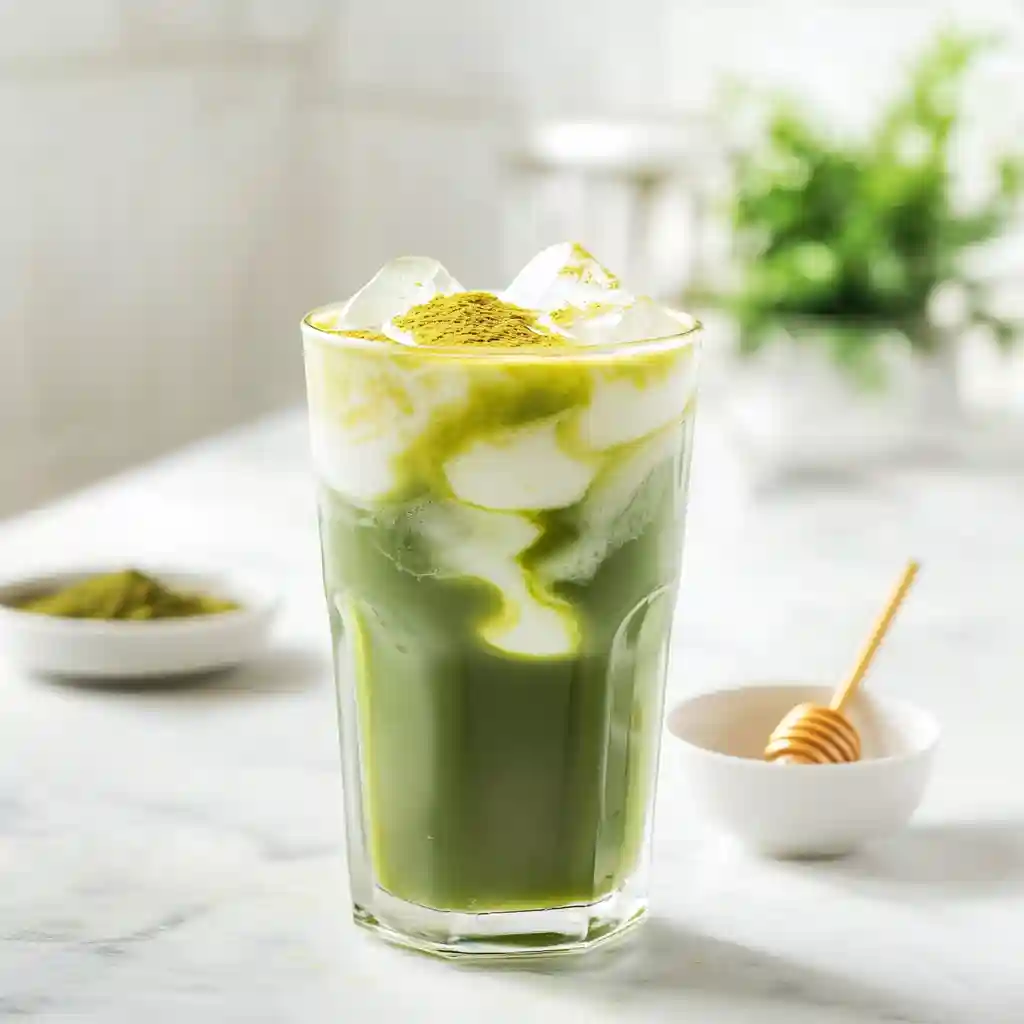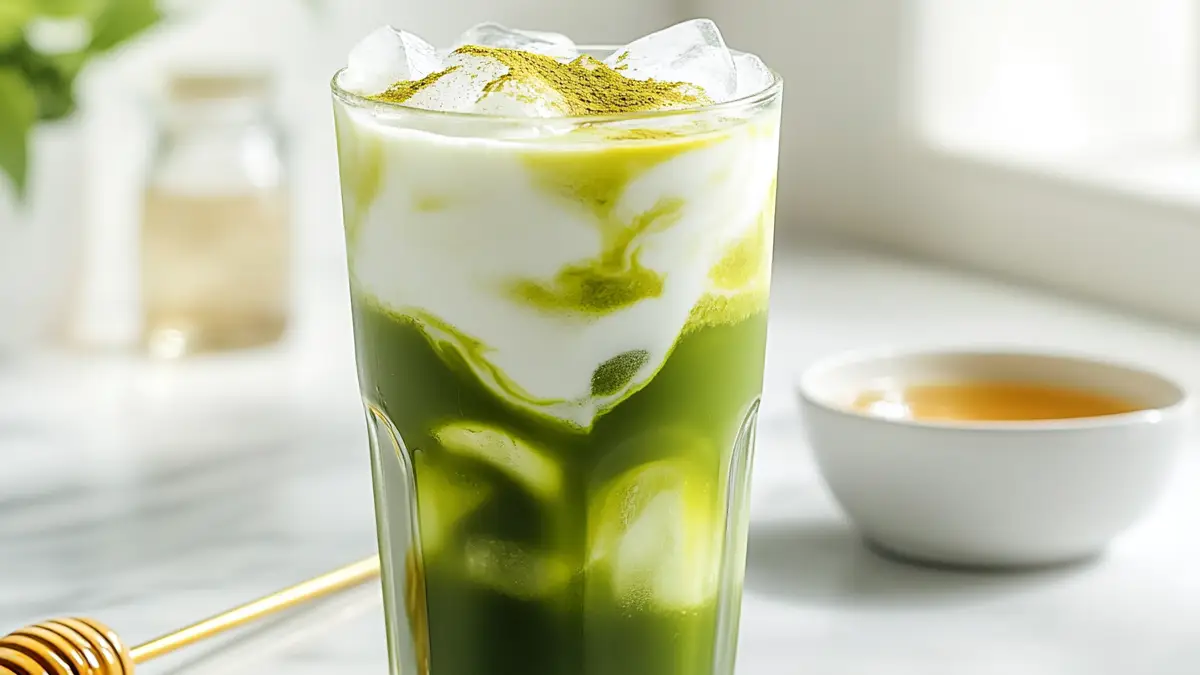Table of Contents
There’s something incredibly calming about preparing matcha. The way the powder swirls into the water, the vivid green color, and that first earthy sip—it all brings me back. One summer, when I was visiting family in Kyoto, my grandmother surprised me with a glass of cold matcha tea instead of the usual warm cup. I remember the way the chilled drink cut through the heat, smooth and slightly sweet, with a vibrant depth unlike anything I’d tasted before.
That moment stuck with me, and now I make it every summer. This cold matcha tea recipe captures that simple joy and turns it into something you can easily whip up at home, no matter the season. Whether you’re trying matcha for the first time or just looking for a better way to beat the heat, this guide will walk you through how to make cold matcha tea that’s smooth, satisfying, and packed with the flavor of tradition.
In this article, you’ll discover why cold matcha tea is more than just a trendy drink, the best ingredients to use, how to prepare it step-by-step, and pro tips to perfect your cup every time. Let’s dive in!
Why You’ll Love This Cold Matcha Tea Recipe
Cold matcha tea is the ultimate summer refreshment—clean, earthy, and naturally energizing. Packed with antioxidants and L-theanine, it delivers calm focus without the crash of coffee. Its smooth, slightly sweet taste shines on its own or with a splash of milk or honey. You’ll love how easy it is to make—no fancy tools needed, just matcha, water, and a good shake or whisk. Whether you’re cooling down post-workout or just craving a beautiful, vibrant drink, this will be your go-to.
But first, what is matcha exactly?
Matcha is a finely ground powder made from specially grown and processed green tea leaves. Unlike traditional green tea, where leaves are steeped and discarded, matcha is whisked directly into water, so you consume the whole leaf—maximizing its nutrients and benefits.
Grown in the shade for several weeks before harvest, matcha leaves develop higher levels of chlorophyll, giving it that signature vibrant green color and a naturally smooth, slightly grassy flavor. The leaves are then steamed, dried, and stone-ground into a fine powder.
Because you drink the entire leaf, matcha delivers more antioxidants (especially EGCG), a gentle caffeine lift, and the calming amino acid L-theanine, which together offer focused energy without the crash. That’s why matcha has been used in Japanese tea ceremonies for centuries—and why it’s so popular today in drinks, smoothies, and even baked goods.
Ingredients for Cold Matcha Tea
To make cold matcha tea that’s smooth, flavorful, and not bitter, starting with the right ingredients is key. This recipe keeps it simple and clean—no syrups or additives—just pure matcha goodness. Here’s everything you need to get started.
- High-Quality Matcha Powder (Ceremonial or Culinary Grade)
The star of the show is, of course, matcha powder. For cold matcha tea, always choose a high-quality ceremonial grade if you want a vibrant color and smooth, grassy flavor. Culinary grade works too, especially if you’re mixing with milk or sweeteners, but it can be slightly more robust and bitter.
Look for a bright green color—that’s a sign your matcha is fresh and loaded with nutrients. Dull or yellowish powder usually means it’s lower quality or expired. If you’re unsure, start with small batches and check that the matcha whisks easily without clumping.
- Filtered Cold Water or Ice Water
Matcha is delicate, so use filtered cold water to help the flavor shine. You’ll need about ½ cup of water to start, and you can top it up with ice or more water after mixing. If you’re using ice, ensure it’s made from filtered water too—tap water can dull the flavor.
Adding ice right after shaking chills the tea fast and keeps it crisp. Pro tip: for an extra refreshing version, try freezing matcha cubes and blending them with fresh cold water.
How to Make Cold Matcha Tea
Making cold matcha tea is quick and easy—no fancy tools required. Whether you’re using a matcha whisk (chasen), a milk frother, or just a jar with a tight lid, the process takes less than five minutes. Here’s how to make cold matcha tea in four simple steps.
Step 1: Sift Your Matcha Powder
Place 1 teaspoon of matcha powder into a small bowl or glass. Use a fine mesh sieve to sift it if you can—this helps eliminate clumps and ensures a silky texture. Sifting might seem optional, but it makes a huge difference for that smooth, lump-free finish.

Step 2: Add Cold Water & Whisk
Pour in about 2 tablespoons of cold filtered water. Use a bamboo whisk, electric frother, or a regular whisk to mix until the powder fully dissolves and forms a vibrant green paste. This step helps activate the matcha before diluting it, which prevents bitterness and brings out the umami flavor.

Step 3: Shake or Stir with Ice Water
Add the remaining cold water (about ½ cup), then transfer to a lidded jar or shaker with a handful of ice. Shake vigorously for 15–20 seconds until frothy. If you prefer, stir well with a spoon or whisk until evenly mixed and lightly foamy.

Step 4: Serve & Customize
Pour your cold matcha tea over fresh ice in a glass. Sweeten it with honey or maple syrup if desired, or add a splash of your favorite milk to make it a creamy iced matcha latte. Enjoy immediately for the best flavor and chill.

This process is just as foolproof as making our slow cooker summer sides, and just as satisfying to sip. Pair it with your favorite light dish from our summer slow cooking tips to keep your day cool and delicious.
Pro Tips for a Perfect Cold Matcha Tea
Cold matcha tea is simple to make, but a few smart tips can turn a good glass into a perfect one. From choosing the right tools to exploring fun flavor twists, here’s how to make your matcha tea smooth, bright, and irresistibly refreshing.
Essential Tips for Smooth Matcha
Always sift your matcha powder before mixing—it prevents clumping and ensures a silky, frothy finish. Use cold filtered water to avoid any harsh or metallic taste. For best results, whisk the matcha into a small amount of water first to create a paste before adding more liquid. This two-step approach is the secret to a smooth, balanced brew.
For an ultra-refreshing version, shake your matcha with ice in a mason jar or cocktail shaker until frothy. This method creates tiny bubbles and chills the tea quickly, just like we do in our refreshing cheddar and broccoli soup method for locking in flavor.
Flavor Variations to Try
Want to change it up? Add a splash of coconut milk and honey for a tropical twist, or mix in vanilla almond milk for a creamy, subtly sweet iced matcha latte. You can also experiment with adding mint, lemon juice, or even a touch of cinnamon for a unique flavor boost.
Much like our no-bean chili recipe, this recipe is flexible—so don’t be afraid to adapt it to your taste or dietary needs.
Common Mistakes to Avoid
Avoid using boiling or hot water—it “cooks” the matcha and creates a bitter, unpleasant taste. Don’t skip the whisking or shaking step, or you’ll end up with clumps. And make sure your matcha is stored properly—keep it in a sealed container, away from heat and light, to preserve its freshness and color.
Serving Suggestions
Serve your cold matcha tea in a tall glass over ice for the ultimate refreshment. Pair it with light meals like a fresh salad or something cozy but cool, like one of our slow cooker safety-friendly summer recipes. It’s great as a pre-workout drink or midafternoon energizer.
Make-Ahead & Storage
You can make a double batch and store it in the fridge for up to 24 hours. Just give it a shake before serving, as matcha will naturally settle. For even quicker prep, pre-sift your matcha into a small container and portion it for the week.
FAQs About Cold Matcha Tea
Does cold matcha have the same benefits?
Yes, cold matcha tea offers the same incredible benefits as hot matcha. You’ll still get the full range of antioxidants, including EGCG, along with a gentle caffeine boost and calming L-theanine. The cold preparation doesn’t diminish its nutritional value, making it a powerful wellness drink in any season.
What can I add to cold matcha tea for flavor?
You can customize cold matcha with honey, agave, maple syrup, or vanilla extract for sweetness. Add almond or oat milk for a creamy twist, or infuse it with lemon juice, mint, or even cinnamon. Like our super drink for weight loss, it’s easy to tailor to your taste!
Can I use hot water to make cold matcha tea?
It’s best to avoid hot water when making cold matcha tea. High temperatures can make the tea bitter and degrade its delicate nutrients. Instead, use cool or room temperature filtered water, then chill with ice for a smoother, more refreshing flavor.
What’s the difference between ceremonial and culinary grade matcha?
Ceremonial grade matcha is made from the youngest tea leaves and has a smoother, naturally sweet flavor and vibrant green color—perfect for drinking straight. Culinary grade is slightly more robust and earthy, ideal for lattes, smoothies, and recipes. Both work for cold matcha, but ceremonial is the gold standard for taste.
Can I make cold matcha tea ahead of time?
Absolutely! Cold matcha can be prepped in advance and stored in the fridge for up to 24 hours. Just give it a quick shake or stir before drinking, as the powder naturally settles over time. It’s great for busy mornings or ready-to-go refreshment.
Conclusion
Cold matcha tea is more than just a trendy drink—it’s a simple, refreshing way to enjoy the natural power of green tea, even in the hottest months. With the right matcha, fresh cold water, and a few easy steps, you’ll have a smooth, energizing drink you’ll want to sip all summer long. Whether you enjoy it pure or with a twist, cold matcha is here to cool you down and lift you up.
Want more ideas like this? Follow us on Facebook and Pinterest for simple, flavorful recipes!
More recipes you’ll love
- Super Drink for Weight Loss
- Slow Cooker Summer Tips
- Batch Cooking Freezer-Friendly Summer Recipes
- Slow Cooker Safety in Summer

Cold Matcha Tea
Ingredients
Equipment
Method
- Place 1 teaspoon of matcha powder into a small bowl or glass. Use a fine mesh sieve to sift it if you can—this helps eliminate clumps and ensures a silky texture. Sifting might seem optional, but it makes a huge difference for that smooth, lump-free finish.

- Pour in about 2 tablespoons of cold filtered water. Use a bamboo whisk, electric frother, or a regular whisk to mix until the powder fully dissolves and forms a vibrant green paste. This step helps activate the matcha before diluting it, which prevents bitterness and brings out the umami flavor.

- Add the remaining cold water (about ½ cup), then transfer to a lidded jar or shaker with a handful of ice. Shake vigorously for 15–20 seconds until frothy. If you prefer, stir well with a spoon or whisk until evenly mixed and lightly foamy.

- Pour your cold matcha tea over fresh ice in a glass. Sweeten it with honey or maple syrup if desired, or add a splash of your favorite milk to make it a creamy iced matcha latte. Enjoy immediately for the best flavor and chill.

Nutrition
Notes
- Use ceremonial grade matcha for the best flavor and color.
- Store leftovers in the fridge up to 24 hours—shake before drinking.
- Customize with lemon, mint, or milk to match your preference.
- Don’t use hot water—it makes the tea bitter.




